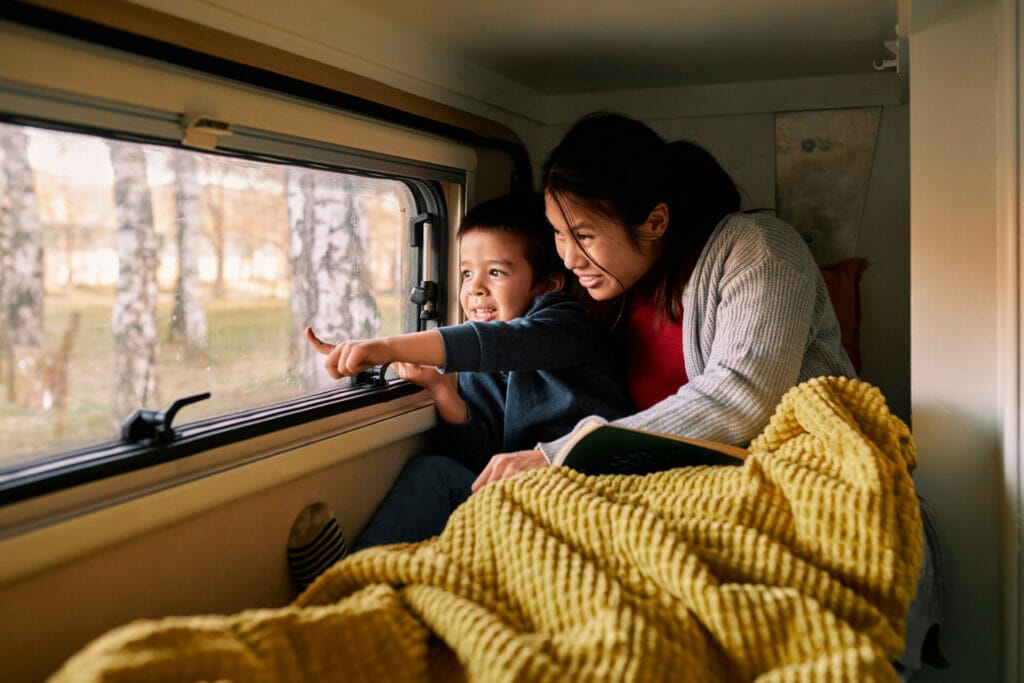Imagine the thrill of endless exploration, yet still nailing spelling tests. Welcome to road schooling, the perfect blend of travel and education. As an RV family, you’re no stranger to challenges, but making school work on wheels can seem daunting. Fear not! This article guides you in creating a successful mobile learning environment for your kids while continuing your nomadic journey. Let’s make your RV life an educational adventure!
Key Takeaways
- Road schooling combines travel and homeschooling to provide a unique educational experience for kids.
- Balancing travel and studies requires setting specific study times and incorporating elements of travel into lessons.
- Developing a curriculum for nomadic learning involves identifying essential subjects, using online resources, and embracing experiential learning.
- Essential tools for learning on the go include educational apps, portable Wi-Fi hotspots, and e-readers, but they should supplement the curriculum, not replace it.
Understanding the Concept of Mobile Education
You’ll need to grasp the concept of mobile education if you’re planning on road schooling your kids. It’s a unique approach, often adopted by families living an RV lifestyle, that combines travel with homeschooling. However, it’s not just about academics. Mobile education also involves teaching practical skills and life lessons that aren’t usually part of a traditional curriculum .
The beauty of road schooling is its adaptability and flexibility. You can tailor your child’s learning to their interests and pace. This might involve math lessons one day and exploring national parks for science the next! Remember, you’re not just confined to textbooks; the world becomes your classroom. Embrace this opportunity to give your children a rich, diverse educational experience they wouldn’t get in a typical school setting.
Balancing Travel and Studies
Balancing travel and studies can be a bit tricky, but it’s definitely manageable with the right approach. Prioritize your child’s education just as much as you would in a traditional setting. This means setting aside specific times for studying and sticking to them, regardless of where you’re parked for the night.
Make learning interactive by incorporating elements of your travels into lessons. For example, if you’re exploring national parks, use that as an opportunity to teach geography or natural sciences. It’s also important to keep communication lines open with your kids about their educational needs and feelings towards road schooling.
Remember, the goal isn’t just to see new places but also provide a robust education on-the-go. With careful planning and flexibility, you can make this unique lifestyle work for your family.
Developing a Curriculum for Nomadic Learning
Creating a curriculum for nomadic learning can be an exciting challenge, allowing you to custom-fit your child’s education to their interests and the dynamic environment around them. Start by identifying what subjects are essential for your child’s grade level. Then, find ways to incorporate real-world experiences into these areas of study. For example, if you’re traveling through a historical location, make that part of your history lesson.
Next, consider incorporating online resources and homeschooling materials for structured learning. Don’t forget about the potential of experiential learning too; hands-on activities provide invaluable life skills lessons.
Finally, remember it’s okay to be flexible. Some days might not go as planned—embrace this as part of the nomadic schooling journey! Your kid’s education doesn’t have to look like everyone else’s—it’s about finding what works best for your family.
Essential Tools for Learning on the Go
Having the right tools at hand can significantly simplify on-the-go learning, while also making it more engaging and effective. You’re not limited to textbooks and worksheets when road schooling your kids. Today’s technology offers a plethora of resources that can enrich your child’s learning experience.
- Educational Apps: There are countless educational apps available for smartphones and tablets that cover various subjects. These make learning fun and interactive.
- Portable Wi-Fi Hotspot: This allows you to access online resources anywhere, anytime. It’s an essential tool for homeschooling on the road.
- E-Readers: E-readers like Kindle can store thousands of books in one compact device, saving space and weight.
Remember, these tools are meant to supplement your curriculum, not replace it completely. Balance is key in this nomadic lifestyle!
Overcoming Challenges in Mobile Education
While it’s true that mobile education comes with its own set of challenges, there are ways to effectively manage and overcome them. You might worry about your child’s socialization or the lack of a structured environment. But remember, RV life offers unique opportunities for socializing at campsites, parks, and local events. Plus, you can create a structured learning environment right in your RV.
The key is to be flexible and adapt your teaching methods as needed. Perhaps one day involves hands-on nature study while another focuses on online coursework. Don’t forget to leverage digital resources like educational apps and websites. Your children will still receive a comprehensive education – they’re just doing it differently! Embrace these challenges as part of the adventure; after all, overcoming them is what makes road schooling so rewarding.


